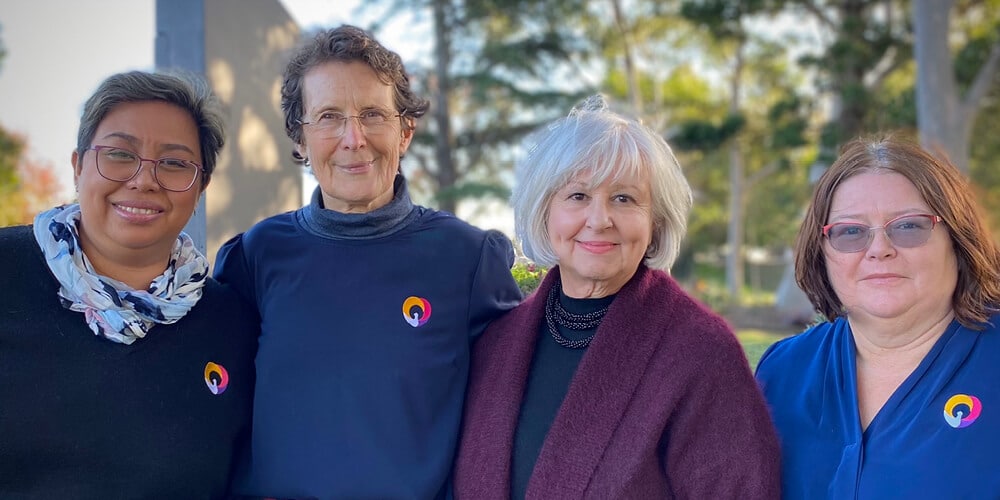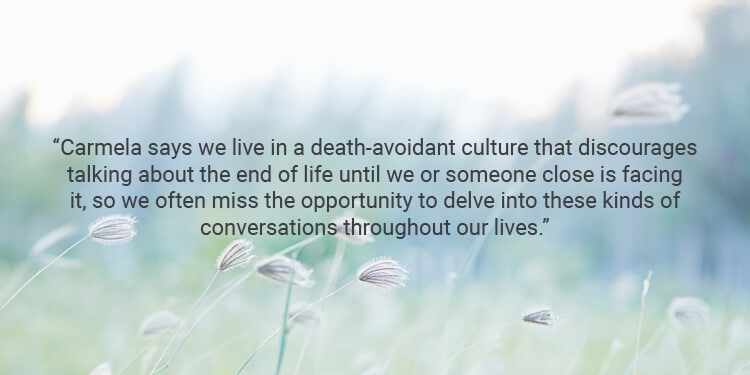
This Feature article was provided by OpusXenta with Carmela Di Pietro, about what services are available to people who are dealing with grief and bereavement.
A Companion. A Community
Grief Care gives people:
- Clear information, definitions, and language that can broaden our understanding and help us make informed choices
- Tools and opportunities that may be helpful to name & navigate our feelings and experiences with one another
- Current evidence-based and observed understandings of loss, grief, trauma, and bereavement
- A deeper awareness of the riches of tradition and rituals around suffering, dying, death, and the afterlife – that are really consoling and invite us to make and find meaning in our experiences
- An opportunity to ask the many questions that are important
- A community context that helps people not to feel so alone
All this gives people the encouragement, the confidence, and the capacity to start their own unique conversations.
Catholic Cemeteries and Crematoria are set apart from other cemeteries in that they are part of the ministry of the Church.
They minister to the deceased, the bereaved, the poor, and the alienated as well as to local parish communities.
People from other Christian denominations and faith traditions are very welcome.
They aim to be inclusive at every opportunity and are a family that services other families in times of their greatest need.
The CCC Grief Care team can also offer expert advice on starting funeral planning, choosing cemetery services and locations, local support networks, and much more.
People seeking more information about any aspects of loss, grief, trauma and bereavement, can visit catholiccemeteries.com.au/grief-care/
Catholic Cemeteries and Crematoria (CCC) Grief Care Program Development Coordinator Carmela Di Pietro talks to us about the grief and bereavement services they provide at Catholic Cemeteries & Crematoria Trust (CCC Trust).
It goes without saying that the death of someone close can be overwhelming.
Every situation is unique, and everyone’s needs are different.
But, according to the team at the 151-year-old Catholic Cemeteries & Crematoria Trust (CCC Trust) in Sydney Australia, people who have strong support networks to rely on, and families who have clear expectations of each other’s roles, tend to navigate their grief more easily than others.
Catholic Cemeteries and Crematoria (CCC) Grief Care Program Development Coordinator Carmela Di Pietro says choosing a funeral director and final resting place and having a funeral plan in place are all vitally important, but funeral aftercare, which Grief Care provides, has a significant role in the family’s bereavement.
“Grief is a natural reaction to loss, trauma, and bereavement; physical, mental, emotional, social, and spiritual,” Carmela said.
“Through living the human experience of grief, we adjust and adapt to the loss and changes in our life resulting from the death of a significant person.
“We have to somehow adjust to their absence and at the same time find new ways of connecting with them and new ways of living,” she said.
Carmela says the CCC Grief Care Team, under the leadership of Patricia Thomas and co-ordinated by Sigrid Evangelista, Sinead Kent, and herself, offer years of experience in care, empathy, and compassion to individuals, families, and communities living with the impact of loss.
“We are qualified pastoral care practitioners, clinicians, counsellors, educators, and spiritual directors who are present for people through companioning, education, and advocacy.
“There is no timeframe or stages for the grief process – it takes as long as it takes – as learning to live with our loss takes time.
“It can assist people to speak with a Grief Care practitioner who can accompany them in moving with the grief and continuing the bonds with the person who has died,” she said.
Carmela says we live in a death-avoidant culture that discourages talking about the end of life until we or someone close is facing it, so we often miss the opportunity to delve into these kinds of conversations throughout our lives.
“There is socialised silence, so when we or someone close is faced with the imminent reality of dying, we don’t necessarily know how to talk about it.
“Grief Care naturalises, acknowledges, and gives a language and opportunity for people to describe their reality and to have this heard, validated, held, and respected.
“Having ready access to grief and bereavement services means that people can better understand that what they are going through is natural and ok,” she said.

Carmela said the experience of loss, grief trauma, and bereavement is universal and inevitable for each of us and part of being human.
“We are meant to have it present in our lives even if it doesn’t feel that way.
“But we are not meant to do it alone, which might be our experience when we inhabit a culture that treats grief and loss as private matters where they are not talked about and shared.
“A good way to understand this is to look at the word ‘grief’.
“At its’ root, it means to make heavy – so when we have someone who will share the weight – a companion or a community that cares – we can carry and move with it.
“Telling our stories to a trusted other may help to acknowledge the loss, to feel and express the pain.
“It may help us find ways to adapt and adjust; it may help to integrate this story into the bigger story, to find meaning, to grow through it, and be transformed by it.
“Grief is not a problem to be solved so much as a human experience to be lived and shared.
“It’s not the price we pay for love, but more an expression of the deepest love,” she said.
Challenging the current taboos
Sometimes we find it difficult to express how we are feeling with those closest to us.
We worry about how discussing our fears and our concerns will impact other people, with their own fears and concerns.
Grief Care can help us to start a conversation, perhaps with another who we can trust, who we can tell our worries to, honestly, express our feelings, and who will listen without judgement or trying to fix us or the situation – a companion.
It also starts broader conversations in the community, which challenges the current taboo in talking about death, dying, and grief.
This can be the springboard to conversations with family members and friends, maybe even encouraging a conversation about this at any stage of life.
What companions in grief offer is someone who will be with them as they feel, think, and live and a safe, caring place where they feel they belong.
Often when we express our grief in visible and tangible ways or seek further support, we can be perceived to not be doing well in our grief.
People might say “oh he or she’s not coping” or “not dealing with it” or “not finding closure” (terms that do not actually describe the experience at all…) … but the seeking of support from others we trust is fundamental and healthy and is a sign we are living our grief well.
It’s not a weakness, it’s necessary.
Only, a small percentage of us will go on to need professional or expert help in our grief and it’s important that we do – but for most of the rest of us, we will need people we trust, to listen to us and be with us in this experience.
A Companion. A Community
Some of the unique Catholic Cemeteries and Crematoria (CCC) Grief Care offerings:
- Assistance in the preparation of funerals and remembrance services
- Opportunities to remember as a community throughout the year
- Invitations to the community to join together at services for specific kinds of losses such as Father’s Day and Mother’s Day, pregnancy, infant and child loss, Christmas Multifaith Remembrance, All Souls, Mention my Name (people touched by suicide), Remembering our babies, Mass for Deceased Clergy, Interment of the homeless, This is Your Home (for people whose grief is not recognised)
- Regular Masses and gatherings including our Monthly Memorial Masses at all three locations (Rookwood/ Liverpool and Kemps Creek).



